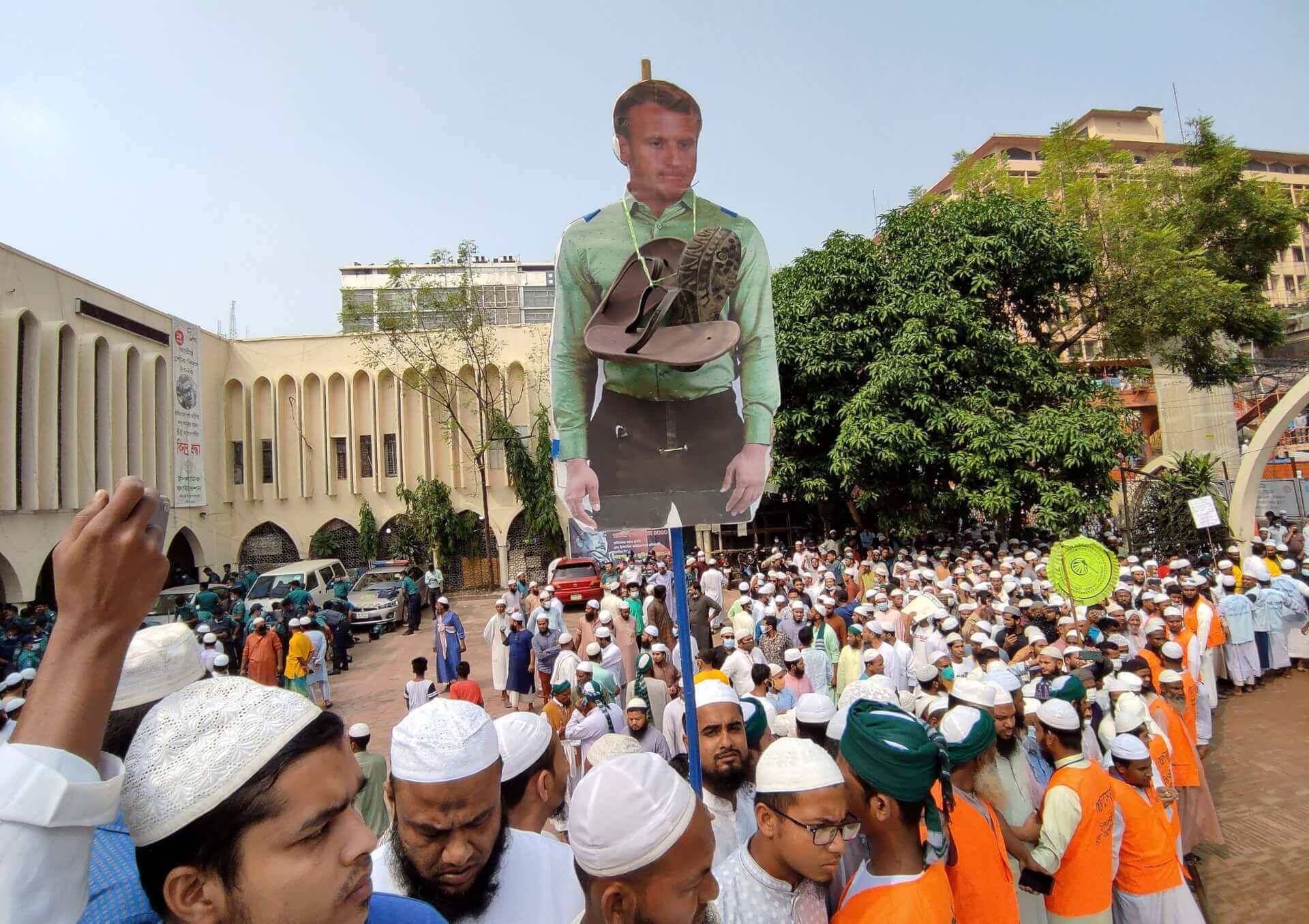Muslims in several Islamic states are demanding a boycott of French products after President Emmanuel Macron critiqued Islam and defended the public display of cartoons depicting Prophet Muhammad. Doubled with Paris’ introduction of new laws to clamp down on Islamic organizations and mosques, the country’s left, as well as Muslims from across the globe, have slammed the French President’s comments and moves as discriminatory.
The reactions closely followed Macron’s speech on 6 October, wherein he vowed to pursue significant changes in French laws to combat growing radicalism amongst French Muslims. The announcement was followed by the death of Samuel Paty, a 47-year old secondary school teacher, who was beheaded in Conflans Saint-Honorine. The assailant was identified as an 18-year-old Chechen refugee. The attack was in response to a classroom discussion conducted by Paty in which he displayed cartoons of Prophet Muhammad, which was considered offensive by several Muslim students and their parents. Consequently, cities across France, including Paris, Lyon, Marseille, and Bordeaux, witnessed large-scale demonstrations, where protestors came out in support of the deceased teacher. Simultaneously, an anti-terror investigation has been initiated by French authorities into Paty’s death.
The most notable reaction has been from Turkey’s President Recep Tayyip Erdogan, who, on Saturday, criticized Macron’s recent crusade against “Islamic separatism,” and claimed that the leader’s comments proved that he needed “treatment” and “mental checks.” Consequently, on Sunday, the French Foreign Ministry announced its decision to recall its ambassador to Turkey. The statement by the ministry said that its decision was a consequence of the “hateful and slanderous propaganda against France, testifying to a desire to stir up hatred” against the country and French institutions at large.
But Turkey is not alone—Pakistan, its closest ally, also passed a Parliamentary resolution on Monday seeking to recall its envoy to France, despite not having one at all. In Dhaka, Bangladesh, more than 40,000 demonstrators took to the streets on Tuesday, calling for the boycott of French goods. Some protestors even burnt an effigy of Macron and called for him to be punished. Further, Malaysia’s Foreign Minister Hishammuddin Hussein said, “As a matter of principle, we strongly condemn any inflammatory rhetoric and provocative acts that seek to defame the religion of Islam.” Shi’ite power Iran also summoned Paris’ envoy to lodge a protest against Macron’s moves and statements, while several Kuwaiti, Qatari, and Jordanian retailers have already removed French products from their shelves.
See also: Macron’s Plan to Combat “Islamic Separatism” Fails All But Himself
Interestingly, Saudi Arabia, which is hailed as the leader of the world’s Sunni community, has held back from joining in calls for action against France. However, a foreign ministry official did state that the Gulf power “condemns all acts of terrorism”, hinting at Paty’s unfortunate death. Simultaneously, the statement also made a veiled reference to the cartoon scandal. “Freedom of expression and culture should be a beacon of respect, tolerance and peace that rejects practices and acts which generate hatred, violence and extremism and are contrary to coexistence,” it said.
The Grand Mufti of Chechnya, however, from where Paty’s alleged assailant hails, called Macron “terrorist No. 1 in the world,” accusing the leader of insulting the Prophet and ordering the display of the cartoons on “all government buildings in France.” Further, Chechen leader Ramzan Kadyrov, a close ally of Russian President Vladimir Putin, slammed Macron by accusing him of inspiring terrorist activity by justifying the cartoons under the garb of free speech.
Macron has reacted to this backlash by warning French citizens in Muslim-majority and Islamic countries all over the world to exercise caution and take extra safety measures as anger levels rise. Conversely, French satirical magazine Charlie Hebdo, which was at the centre of a similar cartoon scandal in 2015, featured an Erdogan caricature on their latest cover, drawing further ire from the Turkish administration.
For Macron, his stance of needing to “free Islam in France from foreign influences” and his plan to ban Imams from receiving training abroad and take control of mosques’ funding has drawn criticism from the country’s left for being Islamophobic. On the other hand, the far-right has shunned the move for not being strict enough on immigration. The question of exercising control over Islamic activities is expected to be central to the debate in the upcoming 2022 presidential election, where both Macron and his opposition are slated to highlight their stances on the issue.
All of this has also come in the context of several Islamist attacks in France in recent years, including the 2015 killing of 130 people in a series of attacks in Paris, a truck incident in Nice in the same year that claimed 86 lives, and the 2016 Charlie Hebdo shooting.

